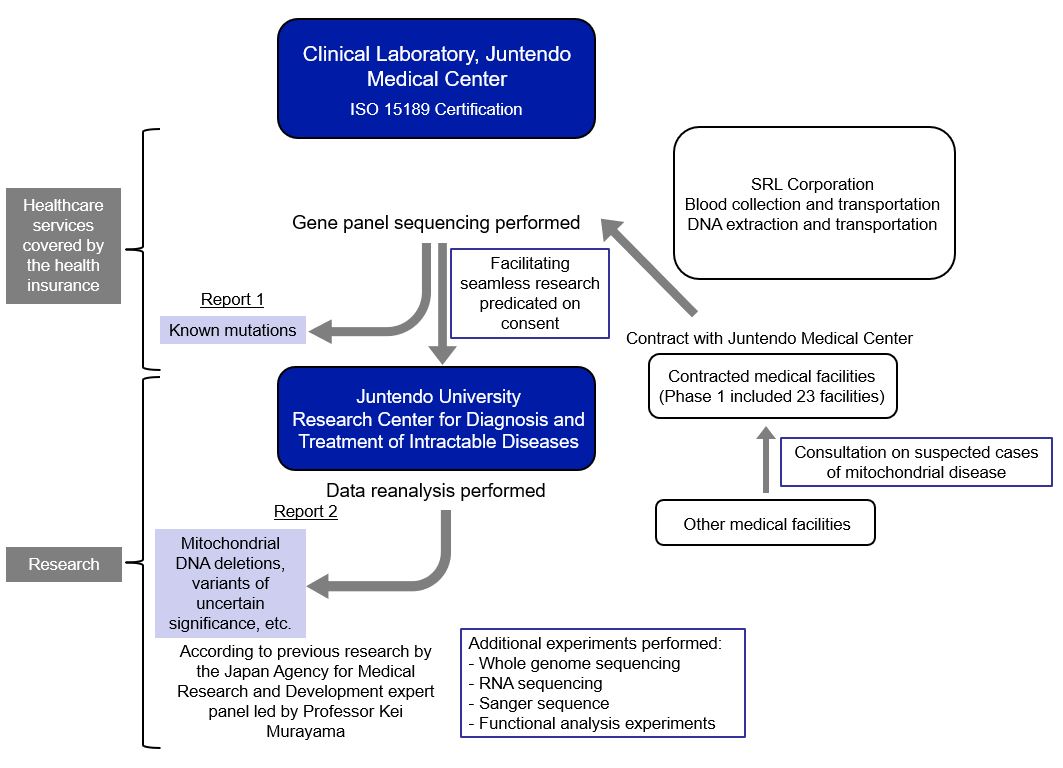Topics
>RESEARCH
Juntendo University Broadens the Scope of Mitochondrial Disease Testing
Juntendo University Broadens the Scope of Mitochondrial Disease Testing
The Intractable Disease Research Center at Juntendo University will conduct broader analyses of mitochondrial genetic data to confirm genetic diagnosis.
Mitochondrial diseases are the most frequently occurring congenital metabolic disorders. Researchers at Juntendo University have developed a mitochondrial disease gene panel test that profiles 367 marker genes across mitochondrial and nuclear DNA. However, the test itself isn’t sufficient to confirm a genetic diagnosis and warrants further research. The Intractable Disease Research Center will conduct deeper genetic analyses on gene variants of unknown clinical significance to improve the accuracy of diagnosis.
Mitochondrial disease occurs when malfunctioning mitochondria cannot sustain the production of adenosine triphosphate (ATP)—the energy currency of life—in the inner mitochondrial membrane. The loss of this vital molecule has far-reaching consequences that affect various organ systems and can cause psychiatric symptoms, cardiomyopathy, seizures, kidney and liver dysfunction, and hearing loss.
Unfortunately, mitochondrial disease is the most common congenital metabolic condition, with one case detected for every 5000 live births. In 2022, to improve disease surveillance and the understanding of the genetic factors behind the condition, the Japanese Ministry of Health, Labor, and Welfare included mitochondrial genetic testing under medical service fees covered under insurance.
In terms of testing, Juntendo University screens many babies diagnosed with mitochondrial disease each year. Now, the university will use whole genome sequencing, RNA sequencing, and functional analyses to provide finer-grained insights that facilitate more accurate genetic diagnoses.
The program will be feasible mainly due to the endeavors of Professor Yasushi Okazaki’s research group at Juntendo University’s Intractable Disease Research Center. “Our team has developed a sequencing platform using the mitochondrial disease gene panel based on data collected from analyzing over 600 cases. We can now screen 367 causative genes in a sample by sequencing genes from a patient’s nuclear and entire mitochondrial DNA. By enabling us to profile these causative genes in batches, we have increased the efficiency of genetic diagnosis,” says Prof. Okazaki.
The data the lab has already generated highlights how insurance-covered mitochondrial disease testing can bear fruit for diagnosis. Having analyzed 449 suspected cases between January 2020 and December 2022, the team could make a genetic diagnosis for 105 cases using gene panel sequencing. In 67 instances, mitochondrial DNA mutations caused mitochondrial disease. Additionally, 38 cases were due to mutations in nuclear genes. Notably, the researchers identified 35 disease cases with gene variants of unknown clinical significance—an area requiring further research to improve the accuracy of diagnosis.
“Moving forward, the insurance coverage for medical expenses will allow us to cast a wider net when screening for suspected cases. There will be two components to the genetic testing: Juntendo University’s Clinical Laboratory will conduct gene panel sequencing and report known mutations. When the laboratory identifies unknown mutations with the patient’s consent, we will undertake more detailed genomic analyses at the Intractable Disease Research Center,” explains Prof. Okazaki.
Professor Kei Murayama’s Mitochondrial Disease Research Project will supplement genetic testing. The project is a part of the Japanese Agency for Medical Research and Development’s Intractable Disease Practical Application Research Project and aims to address all treatment aspects. In this regard, Prof. Murayama’s team commenced mitochondrial disease outpatient care at Juntendo Medical Center’s Pediatric and Adolescent Department in July 2023.
Schematic Representation of Genetic Testing for Mitochondrial Diseases Facilitated by Juntendo University

Image Caption: In 2022, the Japanese Ministry of Health, Labor, and Welfare revised medical service fees, covering genetic testing for mitochondrial diseases under medical insurance plans. The Center for Diagnosis and Treatment of Intractable Diseases at Juntendo University has established a testing system in cooperation with the Clinical Laboratory of Juntendo Hospital to conduct these tests.
Image Credit: Yasushi Okazaki from Juntendo University
Equipment Used for Mitochondrial Disease Genetic Testing at Juntendo University

Image Caption: Juntendo University researchers created a gene panel test for mitochondrial diseases, examining 367 marker genes in mitochondrial and nuclear DNA. However, the test alone cannot confirm a genetic diagnosis. The Intractable Disease Research Center at the university will perform further genetic analyses on ambiguous gene variants to enhance diagnostic accuracy.
Image Credit: Yasushi Okazaki from Juntendo University
***
About Juntendo University, Tokyo, Japan
Established in 1838 as a medical school, Juntendo University is a private institution that spans multiple campuses in Tokyo, Japan. Although the university initially facilitated only medical education, it expanded its scope in 1946—the university is currently home to diverse faculties, including Medicine, Health and Sports Science, Health Care, Nursing, Health Sciences, and International Liberal Arts. The university actively encourages innovative research with a significant impact on the world.
Website: https://en.juntendo.ac.jp/index.html
About Professor Yasushi Okazaki from Juntendo University
Dr. Yasushi Okazaki started working at Juntendo University in 2017 and is a Professor at the Department of Diagnostics and Therapeutics of Intractable Diseases and also serves as the Director of the Intractable Disease Research Center. He is also the Team Leader of the Laboratory of Comprehensive Genomic Analysis at the RIKEN Center for Integrative Medical Sciences. He earned an M.D. from Okayama University Medical School and a Ph.D. from Osaka University Medical School. His areas of interest include genomic medicine, bioinformatics, and mitochondrial disease. He has published over 200 peer-reviewed articles.